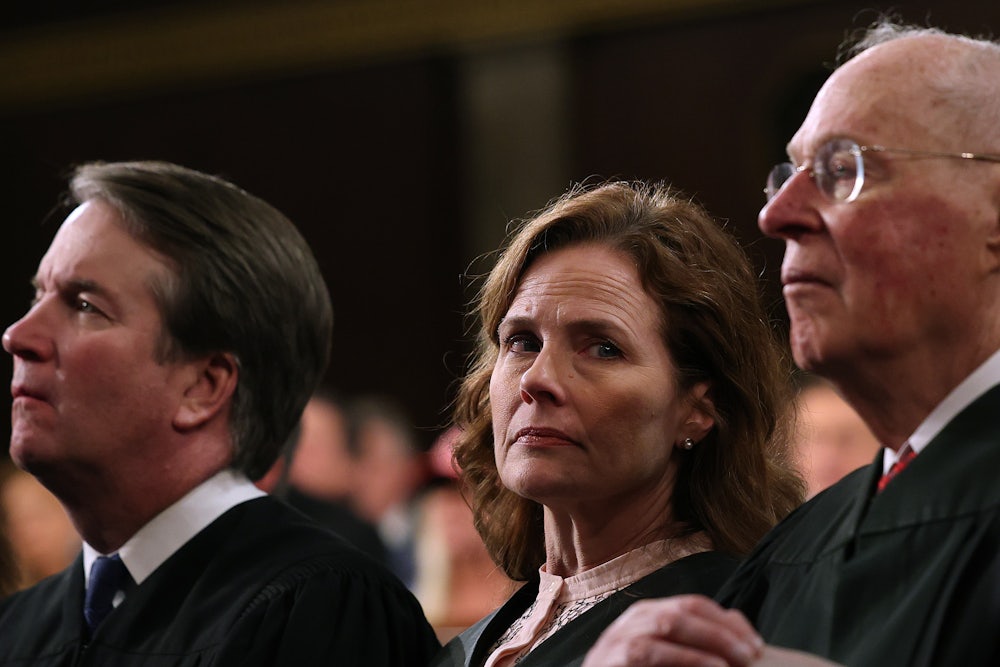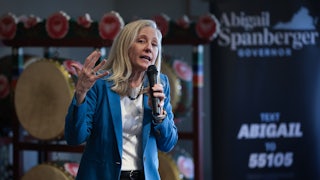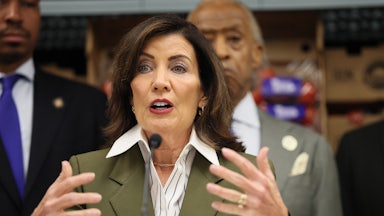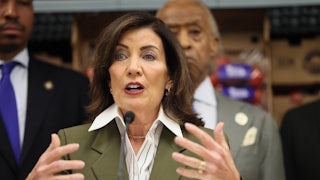I don’t have access to Big Oil’s internal emails about this. But they sure look wildly desperate to dodge the growing array of lawsuits over the damage caused by their decades-long scheme to deceive the public about climate change. Oil companies are doing whatever they possibly can to keep the plaintiffs in these suits (cities, counties, states, and Native American tribes) from having their day in court—and as some of the most powerful corporations in the world, there’s a lot they can do. They’re pushing Congress to pass a blanket waiver of liability for climate-related damages. They’ve deputized the Trump administration to threaten states that are bringing suits. And they have tried—again, and again, and again, and again, and again, and again—to get the Supreme Court to step in and dismiss the cases against them, based on an often contradictory set of legal theories claiming that the state laws they’re being sued under are preempted—i.e., nullified by federal law.
Big Oil has tried five times since 2021 to get the Supreme Court to step in and dismiss these lower court cases, and so far the court has rejected them all. But now the industry is trying once again, petitioning the justices to take up a case filed by the City and County of Boulder against ExxonMobil and Suncor. Last spring, the Colorado Supreme Court ruled that, after seven long years of delay tactics by the industry, this case could finally advance to discovery and trial.
There’s not much that differentiates this latest petition for a writ of certiorari from all the prior ones that the U.S. Supreme Court has already rejected. Legally, the fossil fuel industry’s claims are laughable. Whereas the Supreme Court generally takes cases that can resolve a conflict between different circuit courts, the defendants here are pushing a new theory: They’re claiming that the suit is preempted, not by any particular federal law, or even by federal common law, but rather by the “structure of our constitutional system.” The argument is just as vague and meaningless as it sounds, and to date no appellate court has accepted it.
The Supreme Court is also required to limit its review to final judgments in state cases, versus interlocutory—i.e., nondefinitive—decisions. But in this case, the oil industry is asking SCOTUS to overturn the Colorado Supreme Court’s rejection of the fossil fuel industry’s motion to dismiss Boulder’s complaint—a decision that doesn’t decide the case, just lets it move forward. As Boulder argues, intervening at this early point would require SCOTUS to “wade into a thicket of preliminary questions that promise nothing but rabbit holes and dead ends.”
So why doesn’t the oil industry want to wait for a final judgment? Presumably, because allowing the case to proceed would mean the plaintiffs can, in a phase called discovery, compel the companies to release various materials that they don’t want released—like documents revealing their deceptive conduct. So they’re asking the Supreme Court to step in. And they seem to be betting that, this time, their allies on the court will throw ethical considerations to the wind to grant them the review they’ve been so furiously pursuing.
What do judicial ethics codes have to do with climate deception? It all comes down to simple math. Every year, the Supreme Court receives many thousands of cert petitions. To grant a writ of certiorari, four of the nine justices must agree to take one of these cases. Given that lower threshold, any time a justice recuses themselves based on conflicts of interest it reduces the likelihood that a case will be heard. In this case, multiple justices have conflicts of interest that should take them out of the running to consider these suits—if such principles matter to the Supreme Court’s Republican majority.
One of these conflicted justices is Amy Coney Barrett. Barrett’s father, Michael Coney, worked for nearly three decades as one of Shell’s top attorneys, during which time he was also a “major participant” in the American Petroleum Institute. Coney was at Shell in 1988, when the company issued a “confidential” report projecting that the continued burning of fossil fuels would cause “fast and dramatic” increases in global temperatures that “could have major social, economic, and political consequences.” He was at Shell a year later, when the company produced another “confidential group planning” document predicting that, if fossil fuels were not phased out, climate change would cause “more violent weather—more storms, more droughts, more deluges” that would create so much chaos that “civilization could prove a fragile thing.” He was still there as Shell began redesigning its own infrastructure to prepare for that “violent weather” the company knew was coming. And Coney remained at Shell over the following decade, while the company played a lead role in Big Oil’s fraudulent campaign to lock us into those nightmare climate scenarios it predicted.
While Boulder’s case does not include Shell as a defendant, most of the other climate deception suits—which the Supreme Court’s ruling, if it chooses to take up Boulder, would invariably affect—absolutely do. Given Coney’s highly relevant role at Shell, it’s entirely possible that he could end up being deposed in these proceedings. So Justice Barrett’s decision in Boulder is essentially a choice about whether to subject her own father to potentially significant embarrassment and reputational harm. Clearly, she has a conflict of interest on this topic. In fact, she is so clearly conflicted that during her time on the Seventh Circuit—when she was actually bound by a code of ethics—she regularly recused from cases involving Shell. And yet, since reaching the Supreme Court—which, unlike every other federal court, is not subject to any binding code of ethics—Barrett has regularly participated in cert conferences on climate deception cases. Because why not? Who’s going to stop her?
Another justice, Samuel Alito, has a more traditional conflict of interest: He owns thousands of dollars of stock in the oil giants ConocoPhillips and Phillips 66. Unlike Barrett, Alito has recused himself from considering most, though not all, of the fossil fuel industry’s previous climate deception cert petitions. This includes a 2023 attempt by Big Oil on a prior ruling in Boulder’s case, in which ExxonMobil specifically urged Alito not to recuse himself, arguing in its brief that the case was “an ideal vehicle for resolving the questions presented” because “it involves a smaller set of defendants than those cases and is thus less likely to present recusal issues.” (Never mind that Alito also has up to $100,000 invested in a high dividend yield fund that maintains ExxonMobil as its third-largest holding.)
Thankfully, Alito did not take Exxon’s directive, recusing himself from Boulder in 2023 and from several other climate deception cases afterward, including a petition this past January for the Supreme Court to take up Honolulu’s climate suit, which was virtually identical to the current Boulder petition. And let’s give credit where it’s due—it’s not often we have reason to celebrate Samuel Alito’s integrity.
Unfortunately, Alito has not been consistent in this stance. He joined a dissent authored by Justice Clarence Thomas in the Alabama v. California request, in which Republican attorneys general asked the court to stop climate deception lawsuits from California, Connecticut, Minnesota, New Jersey, and Rhode Island. And he did not recuse himself from considering a petition to review an Eighth Circuit ruling about Minnesota’s climate deception case, which—like Boulder’s—does not include ConocoPhillips as a defendant.
But if Alito has a conflict of interest in one of these cases because he’s invested in ConocoPhillips, then he has a conflict of interest in all of them—even the ones that don’t have ConocoPhillips as a named defendant. That’s because the Supreme Court’s actions in one case will affect all of the others. Indeed, it would be particularly outrageous if Alito—after recusing from Boulder on a different issue and recusing from Honolulu on the same issue—were to help decide whether the Supreme Court should grant Exxon’s wish to take up Boulder’s case.
But that may be exactly what happens. We are, after all, living in an age of elite impunity. More and more Americans are asking whether the wealthy and powerful can do whatever they want—even participate in underage sex trafficking—and get away with it. That’s the same question at the center of these climate deception cases: Can Big Oil knowingly destroy the livability of our one and only planet, yet face zero consequences for exposing untold numbers to financial ruin, death, and the chaos of increasingly likely civilizational collapse?
The fossil fuel industry desperately wants the answer to be yes, which is why these companies are working so furiously to get the Supreme Court to step in and, as Exxon’s assistant general counsel for litigation put it during a recent Federalist Society talk, crush these climate suits “once and for all.” Luckily for Big Oil, its conflicted allies—or, perhaps more accurately, its investors and family members—on the court don’t have a binding ethics code to stop them from weighing in.
But they do have to face public disapprobation. Indeed, it seems likely that Alito’s past recusals may have been motivated in part by the negative attention he was receiving at the time for his previous conflicts of interest. So we must keep making as much of a racket as we possibly can on this. And we must hope that Exxon’s lawyer was right when he complained at that Federalist Society event that communities seeking climate accountability will just “keep trying.” Big Oil wants us to succumb to nihilism when it comes to climate change. Disappoint them: Don’t give in.








